External links
| Nakedness and clothing | |
|---|---|
| Nudity and sexuality | |
| Issues in social nudity | |
| Naturism | |
| Nude recreation | |
| By location | |
| Social nudity advocates | |
| Depictions of nudity | |
| See also | |
Robert Morton | |
|---|---|
| Occupation | Electrical engineer |
| Years active | 1997-2017 |
| Title | Executive Director |
| Movement | Naturism |
| Board member of | Naturist Action Committee |
Bob Morton is an electrical engineer and former Chairman/Executive Director of the Naturist Action Committee, an organization dedicated to defending the civil rights of the naturist community. [1] [2] [3] [4]
As editor of publisher who published one of the first club newsletters for the Hill Country Nudists, in addition to writing about everyday club events, Morton also discussed serious issues regarding the nudist movement and also instituted the policy of printing the full names of members in the newsletter, an unusual practice in the days when the editors of nudist publications were not allowed to use last names of club members.
Morton and his family were plaintiffs in a NAC-supported lawsuit to return the rights of parents who wish to bring their children with them to Hippie Hollow, a clothing-optional public park near Austin, Texas. [5] Morton has also testified before various state legislative committees on behalf of naturists, and was chairman of NAC from 1997 to 2017. Before joining the board, he was an NAC area representative. In addition to watching out for naturist's interests in all 50 states of the U.S., he currently watches for anti-nudity legislation in all 254 counties in Texas since that state voted for home rule, with the result that any county in Texas can enact its own anti-nudist ordinances and laws.
{{cite web}}: CS1 maint: unfit URL (link)
Naturism is a lifestyle of practicing non-sexual social nudity in private and in public; the word also refers to the cultural movement which advocates and defends that lifestyle. Both may alternatively be called nudism. Though the two terms are broadly interchangeable, nudism emphasizes the practice of nudity, whilst naturism highlights an attitude favoring harmony with nature and respect for the environment, into which that practice is integrated. That said, naturists come from a range of philosophical and cultural backgrounds; there is no single naturist ideology.

Hippie Hollow Park is a park located on the shore of Lake Travis in northwest Austin. It is the only legally recognized clothing-optional public park in the State of Texas. Though the land is owned by the Lower Colorado River Authority, it is leased to Travis County, whose Parks Department has administered the park since 1985. Sometimes erroneously labeled as a beach, the park actually sits on a somewhat steep slope above Lake Travis with limestone steps that can be quite rugged in some spots. Depending on the water level of the lake, access to the water may require some rock climbing.

British Naturism is a members organisation with both individual and organisation members. It promotes naturism in the United Kingdom, and it is recognised by the International Naturist Federation as the official national naturist organisation in that country.

The American Association for Nude Recreation (AANR) is a naturist organization based in the United States.
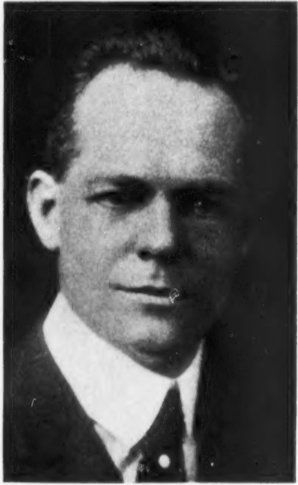
IlsleySilias Boone (1879–1968) was a charismatic speaker, a powerful organizer, a magazine publisher and the founding father of the American Sunbathing Association (ASA)—later reorganized as the American Association for Nude Recreation (AANR). As a publisher he distributed the first nudist magazine in the United States. That publication eventually led to a challenge to the U.S. Postal Service's ban against sending obscene materials through the mail. Boone took his challenge all the way to the U.S. Supreme Court which struck down the ban.

Social nudity is the practice of nudity in relatively public settings not restricted by gender. This occurs both in public spaces and on commercial property, such as at a naturist resort.

Nude recreation refers to recreational activities which some people engage in while nude. Historically, the ancient Olympic Games were nude events. There remain some societies in Africa, Oceania, and South America that continue to engage in everyday public activities—including sports—without clothes, while in most of the world nude activities take place in either private spaces or separate clothing optional areas in public spaces. Occasional events, such as nude bike rides, may occur in public areas where nudity is not otherwise allowed.
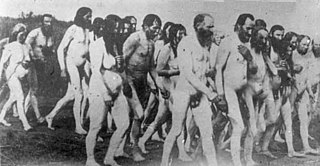
Nudity is sometimes used as a tactic during a protest to attract media and public attention to a cause, and sometimes promotion of public nudity is itself the objective of a nude protest. The practice was first documented in the 1650s with Quakers "naked as a sign" practice. Later the tactic was used by svobodniki in Canada in 1903, and photographs of their nude protests have been published. The tactic has been used by other groups later in the century, especially after the 1960s. Like public nudity in general, the cultural and legal acceptance of nudity as a tactic in protest also varies around the world. Some opponents of any public nudity claim that it is indecent, especially when it can be viewed by children; while others argue that it is a legitimate form of expression covered by the right to free speech.
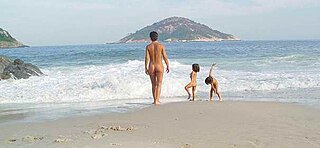
A nude beach, sometimes called a clothing-optional or free beach, is a beach where users are at liberty to be nude. Nude beaches usually have mixed bathing. Such beaches are usually on public lands, and any member of the public is allowed to use the facilities without membership in any movement or subscription to any personal belief. The use of the beach facilities is normally anonymous. Unlike a naturist resort or facility, there is normally no membership or vetting requirement for the use of a nude beach. The use of nude beach facilities is usually casual, not requiring pre-booking. Nude beaches may be official, unofficial, or illegal.
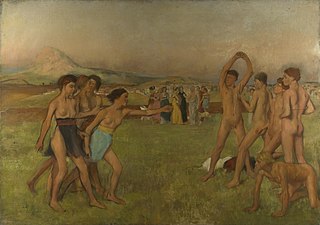
This timeline of social nudity shows the varying degrees of acceptance given to the naked human body by diverse cultures throughout history. The events listed here demonstrate how various societies have shifted between strict and lax clothing standards, how nudity has played a part in social movements and protest, and how the nude human body is accepted in the public sphere.

World Naked Gardening Day (WNGD) is an annual international event generally celebrated on the first Saturday of May by gardeners and non-gardeners alike.
Felicity Jones is an American naturist who blogs pseudonymously for Young Naturists America. She is from Newton, New Jersey and is known for her activism in the nudism and feminism movements. Jones is a feminist who promotes female self-acceptance feminist thinking and opposes fat shaming. She encourages acceptance of sexuality and social nudism in daily life. She has been a contributor to Failure Magazine.
Naturism in the United States is the practice of social nudity as a lifestyle that seeks an alternative to the majority of American society that consider nakedness and sexuality to be taboo based upon the legacy of Puritan and Victorian heritage. Naturist enthusiasts began in the late 1920s with the establishment of members-only communities where they could gather to socialize and enjoy recreation without clothing in an environment that was no more sexual than while clothed. In later decades some groups began advocating for more general acceptance, and the opening up of public land to clothing-optional recreation.
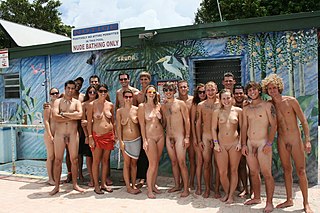
A naturist resort or nudist resort is an establishment that provides accommodation and other amenities for guests in a context where they are invited to practise naturism – that is, a lifestyle of non-sexual social nudity. A smaller, more rustic, or more basic naturist resort may be called a naturist camp.